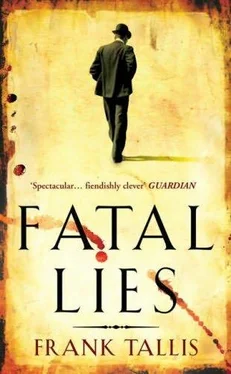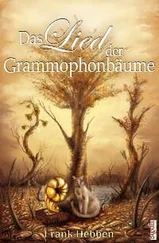Frank Tallis - Fatal Lies
Здесь есть возможность читать онлайн «Frank Tallis - Fatal Lies» весь текст электронной книги совершенно бесплатно (целиком полную версию без сокращений). В некоторых случаях можно слушать аудио, скачать через торрент в формате fb2 и присутствует краткое содержание. Жанр: Исторический детектив, на английском языке. Описание произведения, (предисловие) а так же отзывы посетителей доступны на портале библиотеки ЛибКат.
- Название:Fatal Lies
- Автор:
- Жанр:
- Год:неизвестен
- ISBN:нет данных
- Рейтинг книги:3 / 5. Голосов: 1
-
Избранное:Добавить в избранное
- Отзывы:
-
Ваша оценка:
- 60
- 1
- 2
- 3
- 4
- 5
Fatal Lies: краткое содержание, описание и аннотация
Предлагаем к чтению аннотацию, описание, краткое содержание или предисловие (зависит от того, что написал сам автор книги «Fatal Lies»). Если вы не нашли необходимую информацию о книге — напишите в комментариях, мы постараемся отыскать её.
Fatal Lies — читать онлайн бесплатно полную книгу (весь текст) целиком
Ниже представлен текст книги, разбитый по страницам. Система сохранения места последней прочитанной страницы, позволяет с удобством читать онлайн бесплатно книгу «Fatal Lies», без необходимости каждый раз заново искать на чём Вы остановились. Поставьте закладку, и сможете в любой момент перейти на страницу, на которой закончили чтение.
Интервал:
Закладка:
“I do not know whether my mother and her new husband discussed my paternity-but what I do know is that I was raised in the belief that George Pelletier was my father, and he accordingly treated me like a son. Indeed, a boy could not have wished for a more devoted parent…He died five years ago, and if grief is a measure of affection, then the depth of my sorrow confirmed the strength of our bond. He was a kind, generous man, and I continue to miss his counsel and laughter. Alas, this great loss was soon to be compounded by another. Last year my mother succumbed to a tubercular infection, and on her deathbed-for reasons that I still can only guess at-she decided that the time had come to reveal the truth concerning my provenance. I discovered the name, occupation, and nationality of my real father: a revelation the effect of which-I trust you will appreciate- cannot be overestimated.
“Lyd gate is not so common a name in the British Isles, and, having resolved to begin my inquiries among the better educational establishments of London, I was soon rewarded with success. However, I was reluctant to approach Samuel directly. I did not know what manner of man he was-or how he might respond if I presented myself at his door.
“I am accustomed to uncovering facts-it is, indeed, what constitutes the greater part of my work. I decided that I should discover a little more about Samuel's circumstances before alerting him to my existence. I wanted to know more about him in order to better judge whether or not my appearance would be welcome. My agent in London later informed me that Samuel Lyd gate had a daughterAmelia-who was currently studying at the University of Vienna…
“Dr. Liebermann, you cannot imagine how this intelligence affected me. A sister. I had a younger sister!” Randall looked at Amelia, and his expression, Liebermann noticed, was still-in spite of the passage of time-incandescent with joyful disbelief. “I do not know why I was so profoundly moved-but moved I most certainly was. Further, it occurred to me that there might be certain advantages if I took the trouble to contact my sister before I approached my father: a younger person might be less rigid-better equipped to assimilate such dramatic news. She might even be prepared to act as a kind of intermediary. So I resolved to travel to Vienna… and here I am.”
“A remarkable story,” said Liebermann. “Truly remarkable.”
The subsequent discussion was somewhat circular, returning again and again to reiterations of the fact that Randall Lyd gate's history was-without doubt- remarkable! Indeed, it seemed to Liebermann that repetitions of this nature were something of a necessity and an unspecified number were required before the conversation was free to proceed beyond general expressions of amazement. Eventually, however, a turning point was reached and the issue of how best to inform Samuel Lyd gate of Randall's appearance was given careful and sensitive consideration.
Liebermann's curiosity had been aroused by something that Randall had said earlier, and at an appropriate juncture he said:
“I trust that you will not consider my question impertinent. But you mentioned in passing that your work involves… uncovering facts? What is it that you do?”
“I am an archaeologist,” said Randall.
“And a respected authority,” said Amelia, “on the ancient civilizations of Mexico and Peru.”
“Please… Amelia,” said Randall, embarrassed by his sister's advocacy. “Most of my work takes place in old libraries-poring over ancient maps and mythologies. But on occasion it is my privilege to visit the holy places of the Toltecs, where it is still possible to find- and save-examples of their sublime artistry.”
“The Toltecs?”
“A race alluded to in a migration myth as the first Nahua immigrants to the region of Mexico. The name ‘Toltec’ came to be regarded by the surrounding peoples as synonymous with ‘artist,’ and as a kind of hallmark that guaranteed the superiority of any Toltec workmanship.” As Randall spoke, his voice acquired a mellifluous, dreamy quality, and his eyes seemed to search out a far horizon. “Everything in and about their city was redolent of the taste and artistry of its founders. The very walls were encrusted with rare stones, and their masonry was so beautifully chiseled and laid as to resemble the choicest mosaic.”
It transpired that Randall had clearly inherited some of his mother's appetite for adventure. For he often accepted commissions from North American universities and museums to journey south- into sometimes remote and dangerous territories-in order to recover lost treasures, the existence of which he ascertained from close readings of native legends (recorded by historians with exotic names such as Zumarraga and Ixtlilxochitl).
As the evening progressed, the conversation ranged over an extra ordinarily broad range of topics: Amelia's research under the supervision of Landsteiner, King Acxitl, dream interpretation, the hallucinatory properties of certain desert mushrooms (an example of which, curiously, Randall happened to have in his pocket), Nietz sche's concept of eternal recurrence, and the syncopated music of the black people of New Orleans (which Randall obligingly whistled while tapping his foot).
Discussion of rags and ragtime led, by some oblique conversational maneuvering, to the waltz, which prompted Amelia to enthuse- at some length-about the ball she had attended with Liebermann. Randall-to Liebermann's surprise-expressed much interest (perhaps anthropological) in Fasching, and the young doctor found himself offering to take both brother and sister to the clock makers’ ball, which was scheduled to take place the following week.
When Liebermann finally took his leave, he felt quite dazed. It had turned out to be an evening very different from the one he had expected. He walked the streets for some time-smoking and thinking-before returning home. When Miss Lyd gate had said goodbye, she had reached out and gently touched his hand. After taking a few steps he had looked back, and the image of her standing in the doorway had impressed itself on his memory. Her white dress had billowed in the breeze, and strands of her spun copper hair had streamed across her face. She had pushed them aside, revealing those arresting eyes. The smile that had been fleetingly present throughout the entire evening was gone, and her expression was intense, penetrating-as if she were looking directly into his soul. Lieber-mann identified the thought as fanciful, but nevertheless felt a shiver of unease.
He had been so very wrong about Miss Lyd gate. Indeed, on reflection, Liebermann concluded that in matters of the heart he had something of a gift for being wrong…
69
The silence that prevailed in the commissioner's office was absolute. It was the kind of stillness that Rheinhardt associated with mortuaries and provincial churches in winter: an icy, unyielding soundlessness-as obstinate as frozen loam. He wanted to speak, but whenever he tried, his courage failed. This silence demanded the utmost care-and if he broke it carelessly, the consequences would be catastrophic.
The commissioner had not moved for some time. His eyes were fixed on a folder occupying the pool of light beneath his desk lamp. It contained Rheinhardt's supplementary report on the murder of Thomas Zelenka. Brugels hand crept into the illuminated circle like a grotesque insect emerging from beneath a stone, the first and second fingers raised and testing the air like feelers. Sustaining a convincing illusion of self-determination, Brugels hand halted before touching the folder-as if it had detected something repellent or dangerous therein. The commissioner's profound, contemplative silence seemed to presage alarming possibilities: not only the prospect of punishment, but actual expulsion from the security office.
Читать дальшеИнтервал:
Закладка:
Похожие книги на «Fatal Lies»
Представляем Вашему вниманию похожие книги на «Fatal Lies» списком для выбора. Мы отобрали схожую по названию и смыслу литературу в надежде предоставить читателям больше вариантов отыскать новые, интересные, ещё непрочитанные произведения.
Обсуждение, отзывы о книге «Fatal Lies» и просто собственные мнения читателей. Оставьте ваши комментарии, напишите, что Вы думаете о произведении, его смысле или главных героях. Укажите что конкретно понравилось, а что нет, и почему Вы так считаете.












